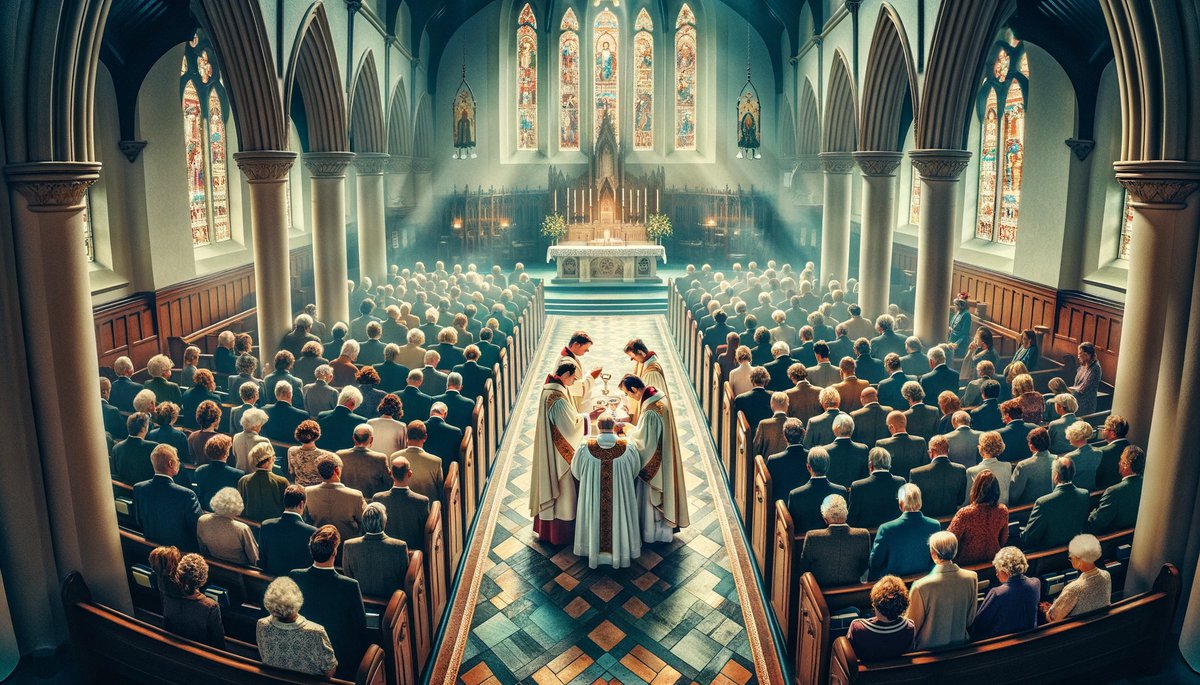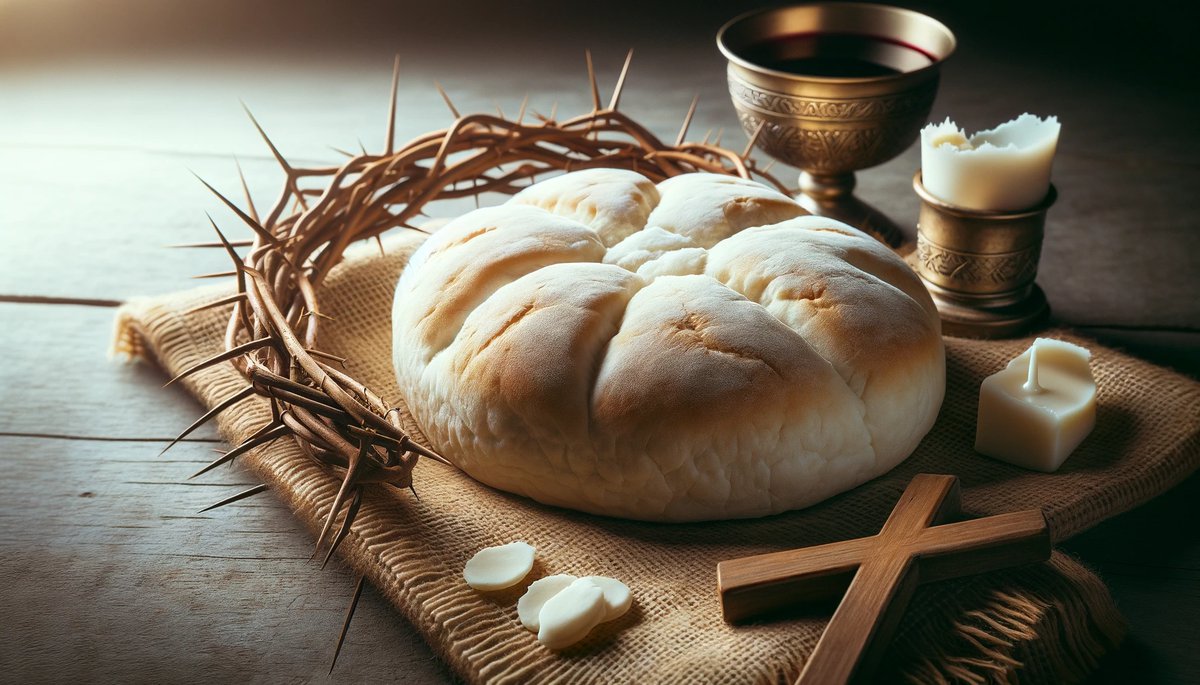Home>Theology and Spirituality>Why Fast An Hour Before Communion


Theology and Spirituality
Why Fast An Hour Before Communion
Published: February 24, 2024
Peter Smith, Editorial Director at Christian.net, combines deep insights into faith, politics, and culture to lead content creation that resonates widely. Awarded for his contributions to religious discourse, he previously headed a major organization for religious communicators, enhancing dialogue on faith's societal impacts.
Learn about the significance of fasting an hour before communion and its connection to theology and spirituality. Explore the spiritual practices and beliefs behind this tradition.
(Many of the links in this article redirect to a specific reviewed product. Your purchase of these products through affiliate links helps to generate commission for Christian.net, at no extra cost. Learn more)
Table of Contents
Introduction
Communion, also known as the Eucharist or the Lord's Supper, holds a central place in the Christian faith. It is a sacred ritual that symbolizes the body and blood of Jesus Christ, and it is a time of deep spiritual significance for believers. The act of partaking in communion is a solemn and reverent practice that serves as a reminder of Christ's sacrifice and the covenant of grace.
Fasting, on the other hand, is a spiritual discipline that has been observed by various religious traditions for centuries. It involves abstaining from food or certain types of food for a specific period, often as a means of seeking spiritual growth, self-discipline, and a deeper connection with the divine.
In the context of communion, fasting an hour before partaking in the sacrament is a practice observed by many Christian denominations. This intentional act of abstaining from food serves as a form of preparation, both physically and spiritually, for the sacred act of receiving the bread and wine.
The significance of fasting before communion lies in its ability to focus the mind and spirit, preparing the individual to approach the table of the Lord with a heart that is attentive, reverent, and spiritually receptive. It is a time of self-examination, reflection, and anticipation, as believers prepare to partake in the symbolic elements that represent the body and blood of Christ.
In the following sections, we will delve deeper into the spiritual significance of communion, the practice of fasting as a spiritual discipline, and the specific benefits of fasting before partaking in the sacred act of communion. Additionally, practical tips for observing this fast will be provided to guide individuals in their spiritual preparation for communion. As we explore these aspects, we will gain a deeper understanding of the profound connection between fasting and communion, and how this practice can enrich the spiritual experience of believers.
The Significance of Communion
Communion, also referred to as the Eucharist or the Lord's Supper, holds profound significance within the Christian faith. It is a sacred sacrament that symbolizes the sacrificial death and resurrection of Jesus Christ. The act of partaking in communion is deeply rooted in the teachings of Jesus, as recorded in the New Testament, and has been practiced by believers for centuries.
At its core, communion serves as a tangible representation of the central message of Christianity—the redemptive work of Christ on the cross. The bread and wine, or in some traditions, the unleavened bread and grape juice, symbolize the body and blood of Jesus, offered as a means of atonement for humanity's sins. This act of remembrance and participation in the symbolic elements fosters a profound spiritual connection with the foundational aspects of the Christian faith.
Moreover, communion is a unifying practice within the Christian community. It serves as a communal expression of faith, as believers come together to partake in the sacrament. This shared experience reinforces the sense of fellowship and unity among believers, transcending individual differences and emphasizing the common bond found in Christ.
The act of partaking in communion also serves as a personal and communal declaration of faith. It is a moment of introspection and spiritual reflection, as individuals contemplate the significance of Christ's sacrifice and the implications for their own lives. Through the act of receiving the bread and wine, believers reaffirm their commitment to Christ and the foundational truths of the Christian faith.
Furthermore, communion is a time of spiritual nourishment and renewal. It provides believers with an opportunity to experience the presence of Christ in a tangible and transformative manner. The act of partaking in the sacrament is believed to impart spiritual strength, grace, and a deepened sense of connection with God, fostering spiritual growth and renewal.
In essence, the significance of communion lies in its multifaceted nature—it is a symbolic representation of Christ's sacrifice, a unifying practice within the Christian community, a personal declaration of faith, and a source of spiritual nourishment and renewal. Understanding the profound significance of communion lays the foundation for appreciating the spiritual discipline of fasting as a means of preparing for this sacred act.
The Spiritual Discipline of Fasting
Fasting is a spiritual discipline that transcends specific religious traditions and holds a universal significance in the realm of spiritual practice. It involves a deliberate and temporary abstention from food, often accompanied by a heightened focus on prayer, meditation, and self-reflection. The act of fasting has been observed throughout history as a means of seeking spiritual enlightenment, self-discipline, and a deeper connection with the divine.
In the context of Christianity, fasting is regarded as a powerful spiritual discipline that facilitates a heightened awareness of God's presence and a deeper understanding of one's spiritual journey. It is not merely an act of physical deprivation but a deliberate and intentional practice aimed at nurturing the soul and cultivating a spirit of humility and dependence on God.
The spiritual discipline of fasting is rooted in the teachings of Jesus Christ, who exemplified and encouraged the practice as a means of spiritual growth and intimacy with God. In the New Testament, Jesus himself fasted for forty days and nights, demonstrating the transformative power of this discipline. His teachings emphasized the importance of fasting as a private and sincere expression of devotion to God, rather than a public display of religious piety.
Fasting serves as a catalyst for self-examination and introspection, allowing individuals to detach from the distractions of daily life and focus their attention on matters of the spirit. It creates a space for heightened spiritual sensitivity, enabling believers to attune their hearts and minds to the voice of God. Through the discipline of fasting, individuals seek purification of the heart, liberation from worldly attachments, and a deepened sense of spiritual clarity.
Moreover, fasting is a practice that fosters empathy and solidarity with those who experience hunger and deprivation on a daily basis. It instills a sense of compassion and social consciousness, prompting individuals to reflect on their blessings and consider the needs of others. This aspect of fasting aligns with the core principles of Christian compassion and social justice, emphasizing the interconnectedness of humanity and the call to alleviate the suffering of others.
In essence, the spiritual discipline of fasting encompasses a profound journey of self-discovery, spiritual renewal, and intimacy with the divine. It transcends the realm of physical abstinence and delves into the depths of the human spirit, offering a transformative pathway toward spiritual growth and enlightenment. Understanding the spiritual significance of fasting provides a meaningful context for exploring its role as a preparatory practice for partaking in the sacred act of communion.
Fasting as Preparation for Communion
Fasting before partaking in communion serves as a profound act of spiritual preparation, aligning the body, mind, and spirit in anticipation of the sacred sacrament. This intentional practice of abstaining from food for a specific period before approaching the communion table holds deep spiritual significance, rooted in the principles of self-examination, reverence, and spiritual readiness.
The act of fasting before communion is grounded in the concept of spiritual purification and attentiveness. By voluntarily refraining from food, individuals create a space for heightened spiritual sensitivity, allowing them to focus their thoughts and emotions on the solemn act of partaking in the symbolic elements of the Eucharist. This deliberate abstention from physical nourishment serves as a means of attuning the heart and mind to the spiritual significance of communion, fostering a state of inner receptivity and reverence.
Furthermore, fasting before communion embodies a sense of spiritual discipline and self-control. It represents a conscious choice to prioritize the spiritual nourishment derived from communion over physical sustenance. This act of self-denial reflects a deep commitment to approaching the sacrament with a clear and focused mind, free from the distractions of worldly concerns. It is a demonstration of the individual's willingness to set aside temporal needs in pursuit of spiritual fulfillment and communion with the divine.
In addition, fasting before communion serves as a form of self-examination and repentance. The period of abstaining from food provides an opportunity for introspection, allowing individuals to reflect on their spiritual journey, seek reconciliation with God, and address areas of spiritual growth and renewal. This practice of self-examination aligns with the traditional elements of preparation for communion, emphasizing the importance of approaching the sacrament with a contrite and humble heart.
Moreover, fasting before communion fosters a sense of anticipation and reverence for the sacred act of partaking in the Eucharist. It creates a space for individuals to prepare themselves mentally, emotionally, and spiritually for the transformative experience of receiving the symbolic elements that represent the body and blood of Christ. This intentional period of fasting heightens the sense of expectation and spiritual receptivity, allowing believers to approach the communion table with a profound awareness of the sacredness of the moment.
In essence, fasting before communion serves as a multifaceted practice of spiritual preparation, encompassing elements of purification, self-discipline, self-examination, and reverence. It is a deliberate and intentional act that underscores the profound spiritual significance of partaking in the Eucharist, enriching the experience of communion with a deepened sense of spiritual readiness and receptivity.
Benefits of Fasting Before Communion
Fasting before partaking in communion offers a myriad of spiritual and practical benefits that enrich the experience of receiving the Eucharist. This intentional act of abstaining from food for a designated period before approaching the communion table holds profound significance, contributing to a deeper spiritual connection and reverence for the sacred sacrament.
One of the primary benefits of fasting before communion is the heightened spiritual receptivity it fosters. By refraining from physical nourishment, individuals create a space for heightened spiritual sensitivity, allowing them to approach the communion table with a clear and focused mind. This heightened receptivity enables believers to engage more deeply with the symbolic elements of the Eucharist, fostering a profound sense of spiritual communion with the body and blood of Christ.
Moreover, fasting before communion serves as a practice of self-discipline and self-control. It provides an opportunity for individuals to prioritize spiritual nourishment over physical sustenance, demonstrating a conscious choice to set aside temporal needs in pursuit of spiritual fulfillment. This act of self-denial reflects a deep commitment to approaching the sacrament with a reverent and disciplined spirit, free from the distractions of worldly concerns.
Additionally, fasting before communion facilitates a sense of spiritual preparation and anticipation. The intentional period of abstaining from food creates a space for believers to mentally, emotionally, and spiritually prepare for the transformative experience of partaking in the Eucharist. This heightened sense of anticipation and spiritual readiness enriches the act of receiving the symbolic elements, allowing individuals to approach the communion table with a profound awareness of the sacredness of the moment.
Furthermore, fasting before communion aligns with the traditional elements of self-examination and repentance associated with the preparation for the sacrament. It provides individuals with an opportunity for introspection, reflection, and reconciliation with God, fostering a state of humility and contrition. This aspect of fasting contributes to a deeper spiritual engagement with the act of receiving communion, allowing believers to approach the table of the Lord with a humble and repentant heart.
In essence, the benefits of fasting before communion encompass a holistic enrichment of the spiritual experience, encompassing elements of heightened receptivity, self-discipline, spiritual preparation, and self-examination. This intentional practice contributes to a profound and transformative experience of partaking in the Eucharist, fostering a deepened sense of spiritual connection and reverence for the body and blood of Christ.
Read more: 20 Prayers Before Communion
Practical Tips for Fasting Before Communion
Fasting before partaking in communion is a deeply meaningful practice that requires thoughtful preparation and spiritual intentionality. Here are practical tips to guide individuals in observing this sacred fast:
-
Mindful Preparation: Begin by setting a clear intention for the fast. Reflect on the spiritual significance of communion and the purpose of fasting as a means of preparation. Approach the fast with a spirit of reverence and anticipation, recognizing it as a sacred opportunity for spiritual communion.
-
Consultation with Spiritual Leaders: Seek guidance from spiritual leaders or clergy within your faith community. They can provide valuable insights and pastoral care to support your journey of fasting before communion, offering personalized advice based on your spiritual needs and circumstances.
-
Hydration and Nutritional Balance: While abstaining from food, it is essential to stay hydrated. Drink plenty of water throughout the fasting period to maintain hydration. Additionally, ensure that your last meal before the fast includes nourishing foods that can sustain you through the period of abstention.
-
Prayer and Meditation: Use the time of fasting as an opportunity for deepened prayer and meditation. Set aside moments for spiritual reflection, seeking a closer connection with God. Engage in contemplative practices that align with your spiritual tradition, allowing the fast to become a time of spiritual enrichment.
-
Physical Rest and Relaxation: During the fasting period, prioritize rest and relaxation. Listen to your body and avoid strenuous physical activities. Create a peaceful environment that fosters a sense of spiritual tranquility, allowing the fast to be a time of both physical and spiritual renewal.
-
Community Support and Encouragement: Engage with fellow believers who are also observing the fast before communion. Share experiences, offer mutual support, and engage in communal prayer and reflection. The collective spiritual journey can provide strength and encouragement as you prepare to partake in the sacrament.
-
Gradual Reintroduction of Food: After partaking in communion, reintroduce food gradually and mindfully. Begin with light, easily digestible foods to ease the transition back to regular eating. Take time to reflect on the spiritual significance of the communion experience and the fast as you conclude this sacred practice.
By incorporating these practical tips into the observance of fasting before communion, individuals can approach the sacrament with a heightened sense of spiritual readiness, reverence, and anticipation. This intentional preparation enriches the experience of partaking in the Eucharist, fostering a deepened spiritual connection with the body and blood of Christ.
Conclusion
In conclusion, the practice of fasting an hour before partaking in communion holds profound spiritual significance, enriching the experience of receiving the Eucharist with a deepened sense of spiritual readiness, reverence, and anticipation. The intentional act of abstaining from food serves as a form of preparation, both physically and spiritually, for the sacred act of communion. By understanding the spiritual significance of communion and the transformative nature of fasting as a spiritual discipline, individuals can approach the communion table with a heightened awareness of the sacredness of the moment.
Fasting before communion encompasses a multifaceted practice of spiritual preparation, encompassing elements of purification, self-discipline, self-examination, and reverence. It fosters a heightened spiritual receptivity, allowing individuals to engage more deeply with the symbolic elements of the Eucharist. Moreover, the practice of fasting aligns with the traditional elements of self-examination and repentance, fostering a state of humility and contrition as believers approach the table of the Lord.
The benefits of fasting before communion extend beyond the individual experience, contributing to a sense of communal unity and spiritual enrichment within the Christian community. This intentional period of fasting creates a shared sense of anticipation and reverence, fostering a collective spiritual readiness as believers come together to partake in the sacrament. It serves as a unifying practice, emphasizing the common bond found in Christ and reinforcing the sense of fellowship among believers.
As individuals observe the sacred fast before communion, it is essential to approach the practice with mindful preparation, seeking guidance from spiritual leaders, and prioritizing hydration and spiritual nourishment. Engaging in prayer, meditation, and communal support further enriches the experience, fostering a deepened spiritual connection with the body and blood of Christ.
Ultimately, the practice of fasting before communion serves as a transformative journey of spiritual preparation, aligning the body, mind, and spirit in anticipation of the sacred sacrament. It underscores the profound spiritual significance of partaking in the Eucharist, enriching the experience with a deepened sense of spiritual connection and reverence for the body and blood of Christ.














